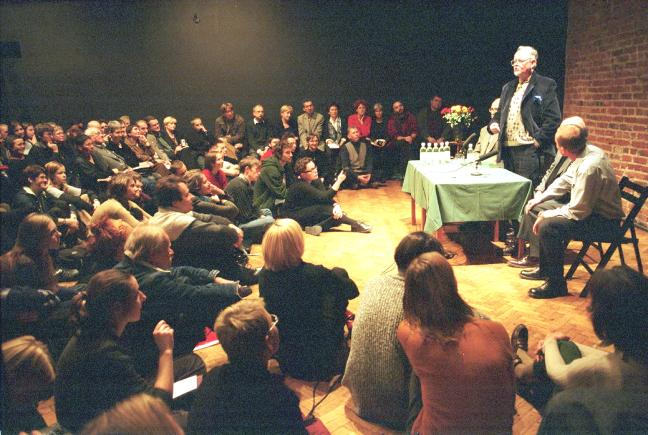|
TENTATIVE APPRAISAL
Where then to situate Moore?Such a question is contingent. So much depends on Gurdjieff himself. If history ultimately consigns him to its ‘dustbin’, it will reserve only a sardonic smile for his followers, apologists, and chroniclers. (Moore would survive merely as the author of one entertaining book on Katherine Mansfield.) Quite a different case, however, should Gurdjieff slowly gain cultural bon ton: should he and his oeuvre become problematically assimilated in academic course-work; should his teaching (conceivably tainted by secular politics) precipitate some gross Weberian social effect. In that case, the creatures of the Gurdjieffian diaspora would be subjected to history’s forensic examination; and Moore, as pioneer biographer and encyclopaedist, would merit a significant footnote.
Meanwhile is Moore better defined by his committed 38-year membership of The Gurdjieff Society or by his dramatic ‘excommunication’ in 1994? He clearly devoted a large segment of his literary life to fending off misrepresentations of Gurdjieff, yet ironically, as Professor Holly Baggett stresses: “...it will be his own work that is seen as threatening the powers that be”. From what, then, did Moore apostacise? In formal terms from the powerful de Salzmann-fixated Gurdjieff Foundations, whose revisionary paradigms and praxis [see ‘Moveable Feasts’ in Secondary Writings module] would themselves have been anathematised as heretical when Moore entered the Work in 1956, seven years after Gurdjieff’s death. It is historically demonstrable that Moore never apostacised from Gurdjieff’s canonical teaching, as received from Henriette Lannes; he still struggles to practise and transmit it, even in old age... Moore can perhaps be categorised as one of those writers and thinkers whose conscience simply found itself in the wrong place at the wrong time. He paid a drastic social penalty but it did not alienate him; he continues to contribute whatever he can to the wider Gurdjieffian cause.
Given that Moore presents as a life-long practitioner as well as a theoretician, there arises the problematical issue of inner transformation. Here Moore presses no claim whatsoever; indeed his memoir verges on the self-deprecating, largely finessing those insights and epiphanies which putatively accrue to any serious pilgrim. All that can be objectively verified is Moore’s lengthy Gurdjieffian pupillage (1956-1994), which evidences him strenuously and consistently engaged under teachers of stature; and which significantly earned him a mandate to transmit the Work himself. He has pupils; he has designated successors.
James Moore passed away at his home in North London on 11 May 2017 and is buried in the churchyard of Holy Trinity Church, Lyne and Longcross.
|
